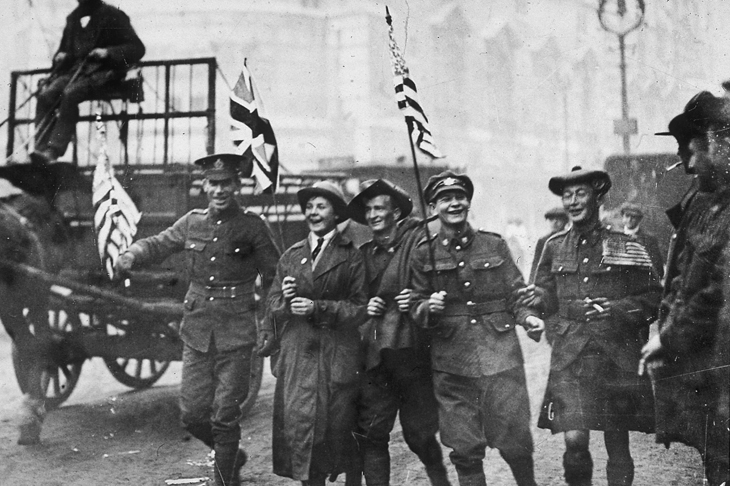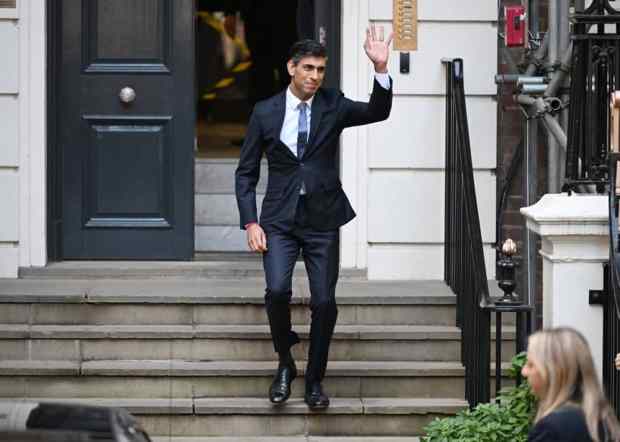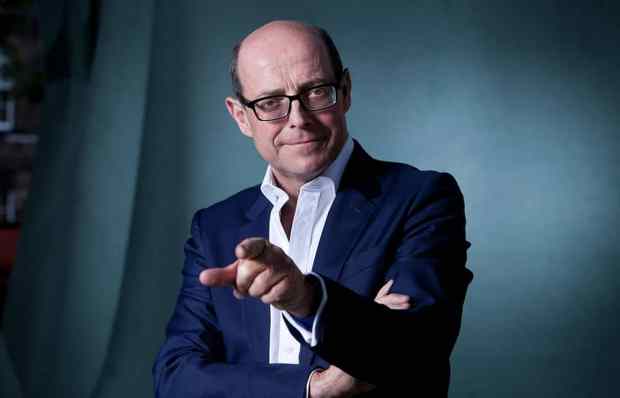The sixth of November 1918 was remembrance day for my great-grandfather, Norman Moore. It was the fourth anniversary of the death of his younger son, Gillachrist (known as Gilla), a second lieutenant in the Royal Sussex Regiment, who had been killed at the first battle of Ypres. Sitting quietly in his London house in Gloucester Place, Moore heard shouting in the street: rumours of peace were spreading. ‘If it be so,’ he wrote in his diary, ‘how appropriate on Gillachrist’s day for he gave his life to resist German power.’ It became so five days later.
On 9 November, NM (as he was always called) attended the Lord Mayor’s Banquet in Guildhall: ‘A fanfare of trumpets announced Mr Lloyd George. Soon after, we went into the great hall, where Mr Pitt, and Beckford & Wellington were ready to add their marble grandeur to the feast.’ The prime minister, whom NM, in those pre-broadcasting days, had never before heard, began, ‘ “The German messengers have not been able to reach Marshal Foch so I have nothing to tell you. I had better stop & go no further.” Cheers sent him on. He told that Kaiser Wilhelm & the Crown Prince had abdicated and then made clear that the acts of war were those not only of the rulers but of the German people themselves & they too must answer… They must agree by 11 on Monday at the latest… He had been a week at Versailles. He had walked in its beautiful woods — the leaves were falling &… the crowns of kings kept falling with each day. He spoke of the young men who had fallen (and my dear Gilla I remembered you).’ NM thought it ‘a noble speech — not equal to Burke — but very great indeed — some of the force of Bunyan in it… The speech itself in that old hall… hung with banners with the chief man of England speaking seemed not a mere relation but an actual scene in the fifth act of a long drawn terrible drama.’
NM’s surviving son, Alan, was a naval surgeon on board HMS Grafton taking troops to occupy the surrendered Turkish forts at Gallipoli which the allies had so famously failed to conquer in 1915. On his brother’s death day, he noted in his journal vague news ‘of a victory for our troops in the West’. In August 1914, he, his father and Gilla had gathered in Sussex, and NM had inscribed beside the fireplace the opening words of the Aeneid, ‘Arma virumque cano’ (see Notes, 2 August 2014). Now, as the story closed, Alan was passing the plain of Troy from which Aeneas fled: ‘The names of some of our ships fit well their surroundings. I saw the destroyers Acheron and Hydra go by this morning.’ On 11 November, the famous telegram from Foch (‘Hostilities will cease on the whole front…’) came through to the ship, and later the signal, ‘The Mainbrace is to be spliced in celebration of the Armistice with Germany.’ ‘This was followed,’ wrote Alan, ‘by cheering and ringing of the ship’s bell.’
In London, a few days later, NM boasted, ‘Our Union Jacks which have come up from Hancox [their Sussex house] look very bright & except Countess Benkendorf’s [widow of the ambassador of Tsarist Russia] ours is the biggest in Gloucester Place.’ He added that he had heard a ‘quaint tale’, indirectly, from Admiral Wemyss, who had signed the Armistice on behalf of Britain. After the meeting with what NM called ‘the Hun delegates’ on Foch’s train in the forest of Compiègne, ‘at 5 a.m. Foch steamed back to Paris & he & Wemyss reported to Clémenceau, at his house, the final and complete acceptation of the terms of the Armistice whereupon by spontaneous and very human impulse these three men joined hands: & alone in the room solemnly danced round.’
This Sunday, in our village, Etchingham, 100 years later, as in thousands, people will gather round the war memorial. A village of (at that time) 400 people commemorates 15 who died in the Great War. (Five others from the village are commemorated elsewhere.) The youngest, Charles Pennells, was the last to die (of wounds), on 5 November 1918. He was 18. Almost all the soldiers were farm labourers, carter’s mates or in outdoor domestic service. They were, as Gray puts it in his Elegy, ‘to fortune and to fame unknown’. Some of the Sussex names survive — Funnell, Pennells, Sweatman, Eastwood — in their nephews and nieces, and in turn their children, in the district.
Rudyard Kipling, who lived in the neighbouring village, unveiled our war memorial in ‘rain, sleet and bitter wind’ in April 1920. He had paid for the memorial himself. The first words of his speech were: ‘We all know grief cannot be cheated’; but he sought comfort in the universality of loss. He recalled, which was extraordinary but true, that ‘We here in the valley heard the guns yonder in France, shaking windows and making our doors creak, day and night for more than four years.’ He had just returned from visiting the scenes of utter devastation in France, he said, and he had noticed boards by the side of the road saying, ‘This was the village of etc etc’. Without men like those commemorated, ‘that would have been our fate today — a wilderness beside a swamp; peopled by survivors living in huts and holes under a signboard that said “Etchingham has once stood here”.’
Kipling observed two other things. The first was how such men ‘kept from us at the time, or hid with a joke what they were called to face in the ordinary course of things’. The second was that, unusually, the Etchingham memorial half blocks the path to the church door: ‘It seems to me wise… that the memorial should have been placed in the spot where it stands,’ he said, because it was right that those going in and out ‘should step a little out of the smooth path and pay reverence and homage to those who offered themselves as a sacrifice’ — remembering that ‘the bravery of their own dead saved England’. One of these was Kipling’s own son.
Got something to add? Join the discussion and comment below.
Get 10 issues for just $10
Subscribe to The Spectator Australia today for the next 10 magazine issues, plus full online access, for just $10.
You might disagree with half of it, but you’ll enjoy reading all of it. Try your first month for free, then just $2 a week for the remainder of your first year.















Comments
Don't miss out
Join the conversation with other Spectator Australia readers. Subscribe to leave a comment.
SUBSCRIBEAlready a subscriber? Log in